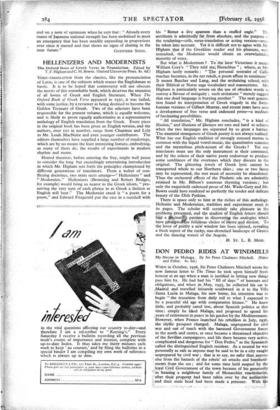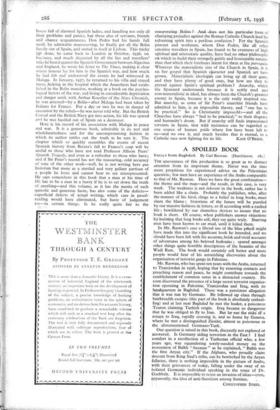DON PEDRO .RIDES AT WINDMILLS
My House in Malaga. By Sir Peter Chalmers Mitchell. (Faber and Faber. 8s. 6d.) WHEN in October, 1936, Sir Peter Chalmers Mitchell wrote his now famOui letter to The Tinier he took upon himself fresh honour'at an age when a man is justified in letting new things pass him by. He had had his "fill of days" of honours and obligations, and when in;May, 1935, he collected his car in ...Madrid and travelled:- leisurely southward. in _it to _ the Villa ; Santa LAIC48. in Malaga-, his new home, his .intention was to begin "the transition from daily toil to what I expected to be a peaceful old age with comparative, leisure." He knew little, and probably cared less, about Spanish politics at that time; simply he Jilted Malaga, and proposed _to ;spend his .years of retirement in peace in his garden by the Mediterranean. However, when Franco latinched his rebellion in July, 1936, , the idyllic prospect changed. Malaga, unprepared for civil -war and out of touch with the harassed Government forces . in the north and centre, at once became a threatened objective of the Sevillan campaigners, and life there became very active, - complicated and dangerous for "Don Pedro," as the Spaniards called the distinguished English resident. As a neutral he was :personally as safe as anyone may be said to be in a city caught 'unprepared by civil war ; that is to say, no safer than anyone ; else from the hazards of the "rebels' air attacks and bombard- ments from the sea ; and for some time held suspect by the loyal Civil Government of the town because of his generosity ,housing a neighbour family of Monarchist reactiOnarins, .'after the* propem, had been talee_n. Over by the authorities and their male 'head had been made a prisoner. With bis house full of alarmed Spanish ladies, and handling not only all their problems and panics, but those also of servants, friends and chance acquaintances, Don Pedro had his hands full until, by admirable manoeuvring, he finally got all the Bolin family out of Spain, and united to itself at Lisbon. This tricky jcib done, he came back to London in October, 1936, On business, and much disgusted by all the lies and travellers' tales he' heard against the Spanish Government between Algeciras and England, he wrote his letter to The Times, making it clear where honour lay for him in the Spanish war, and how much he had felt and understood the events he had witnessed in Malaga. In January, 1937, he returned to his villa and stayed there, _helping in the hospital which the Anarchists had estab- lished in the Bolin mansion, working at a book on the psycho-. logical factors of the war, and living in considerable deprivation and danger until, with Arthur Koestler of the News Chronicle, he was arrested—by a Bolin—after Malaga had been taken by Italians for Franco. For a day or two he was in danger of execution by the rebels—he was never told why. But the British Consul and the British Navy got into action, his life was spared and he was hustled out of Spain on a destroyer.
Here is his record of his association with Malaga in peace and war. It is a generous book, admirable in its zest and wholeheartedness and for the uncompromising fashion in which its author rattles out the truth as he sees it. The chapter which so quickly assembles the events of recent Spanish history from Rivera's fall to Franco's coup will be useful to those who have not read Professor Allison Peers' Spanish Tragedy, and even as a refresher to those who have; and if Sir Peter's record has not the reassuring, cold accuracy of tone of the other work—well, he is not writing here qua historian but more as a startled and very gallant partisan of a people he loves and cannot bear to see misrepresented. He says somewhere in this book that a Man at his time of life has to be a man in a hurry if he is to set down the truth of anything—and this ,volume, as it has the merits of such quixotic and generous haste, has also some Of the defects— superficial defects of actual writing, which care in proof- reading would have eliminated, but haste of judgement too—in certain things. Is he really quite fair to the exasperating -Bohm.? And—does-not--his -particular form of champing prejudice against the Roman Catholic Church lead his reforming spirit into a perilous confusion ? For the Spanish peasant and workman, whom Don Pedro, like all other sensitive travellers in Spain, has found to be creatures of high sUiritual and aristocratic quality, have had_no other Vhilcisophy on which to build their strangely gentle and honourable natures than that which their forebears learnt for them at the parroquia. Whatever the materialistic sins of the Church in Spain, it is on her gospel that Spanish ck,aracter and Spanish art have grown. Materialistic ideologiis can bring up. all their guns, and they have plenty of good ones, but how are they to prevail against Spain's spiritual problem ? Anarchy, which the Spaniard understands because it is nobly mad and non-materialistic in ideal, has always been the Church's greatest enemy in Spain, because it is the only really inspired one. But anarchy, as some of Sir Peter's anarchist friends have admitted to him, is an impossible theory, and ," one has to be practical." So is Christianity impossiblt—and all the Churches have always "had to be practical," to their disgrace and humanity's doom. But if anarchy still finds impassioned servants in Spain, that wild insistence can be regarded as one source of human pride where few have been left to us—and we owe it, and much besides that is eternal, to a Catholic race now fighting for its life. KATE O'BRIEN.











































 Previous page
Previous page